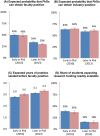The declining interest in an academic career
- PMID: 28922403
- PMCID: PMC5602526
- DOI: 10.1371/journal.pone.0184130
The declining interest in an academic career
Abstract
There is increasing evidence that science & engineering PhD students lose interest in an academic career over the course of graduate training. It is not clear, however, whether this decline reflects students being discouraged from pursuing an academic career by the challenges of obtaining a faculty job or whether it reflects more fundamental changes in students' career goals for reasons other than the academic labor market. We examine this question using a longitudinal survey that follows a cohort of PhD students from 39 U.S. research universities over the course of graduate training to document changes in career preferences and to explore potential drivers of such changes. We report two main results. First, although the vast majority of students start the PhD interested in an academic research career, over time 55% of all students remain interested while 25% lose interest entirely. In addition, 15% of all students were never interested in an academic career during their PhD program, while 5% become more interested. Thus, the declining interest in an academic career is not a general phenomenon across all PhD students, but rather reflects a divergence between those students who remain highly interested in an academic career and other students who are no longer interested in one. Second, we show that the decline we observe is not driven by expectations of academic job availability, nor by related factors such as postdoctoral requirements or the availability of research funding. Instead, the decline appears partly due to the misalignment between students' changing preferences for specific job attributes on the one hand, and the nature of the academic research career itself on the other. Changes in students' perceptions of their own research ability also play a role, while publications do not. We discuss implications for scientific labor markets, PhD career development programs, and science policy.
Conflict of interest statement
Figures





Similar articles
-
Science PhD career preferences: levels, changes, and advisor encouragement.PLoS One. 2012;7(5):e36307. doi: 10.1371/journal.pone.0036307. Epub 2012 May 2. PLoS One. 2012. PMID: 22567149 Free PMC article.
-
The clinical academic workforce of the future: a cross-sectional study of factors influencing career decision-making among clinical PhD students at two research-intensive UK universities.BMJ Open. 2017 Aug 28;7(8):e016823. doi: 10.1136/bmjopen-2017-016823. BMJ Open. 2017. PMID: 28851792 Free PMC article.
-
The Changing Landscape of Doctoral Education in Science, Technology, Engineering, and Mathematics: PhD Students, Faculty Advisors, and Preferences for Varied Career Options.Front Psychol. 2021 Dec 17;12:711615. doi: 10.3389/fpsyg.2021.711615. eCollection 2021. Front Psychol. 2021. PMID: 35069308 Free PMC article.
-
Differences and overlaps between Phd studies in diagnostic microbiology in industrial and academic settings.Med Microbiol Immunol. 2020 Jun;209(3):217-223. doi: 10.1007/s00430-019-00643-4. Epub 2019 Nov 29. Med Microbiol Immunol. 2020. PMID: 31784890 Free PMC article. Review.
-
PhD graduate training programs in pathology: 2003 report from the American Society for Investigative Pathology workshop on pathology graduate education.Hum Pathol. 2004 Jul;35(7):785-9. doi: 10.1016/j.humpath.2004.03.014. Hum Pathol. 2004. PMID: 15257540 Review.
Cited by
-
A Survey on Data Reproducibility and the Effect of Publication Process on the Ethical Reporting of Laboratory Research.Clin Cancer Res. 2018 Jul 15;24(14):3447-3455. doi: 10.1158/1078-0432.CCR-18-0227. Epub 2018 Apr 11. Clin Cancer Res. 2018. PMID: 29643062 Free PMC article.
-
Translating mentoring interventions research into practice: Evaluation of an evidence-based workshop for research mentors on developing trainees' scientific communication skills.PLoS One. 2022 Feb 2;17(2):e0262418. doi: 10.1371/journal.pone.0262418. eCollection 2022. PLoS One. 2022. PMID: 35108289 Free PMC article.
-
How Environment, Cognition, and Behavior Shape Doctoral Students' Academic Career Intentions: Insights from a Comprehensive Study.Behav Sci (Basel). 2025 Jul 21;15(7):990. doi: 10.3390/bs15070990. Behav Sci (Basel). 2025. PMID: 40723774 Free PMC article.
-
Trends in Research and Graduate Affairs in Schools and Colleges of Pharmacy, Part 2: Students.Am J Pharm Educ. 2020 May;84(5):7642. doi: 10.5688/ajpe7642. Am J Pharm Educ. 2020. PMID: 32577032 Free PMC article.
-
Improving Undergraduate Life Science Education for the Biosciences Workforce: Overcoming the Disconnect between Educators and Industry.CBE Life Sci Educ. 2018 Sep;17(3):es12. doi: 10.1187/cbe.18-03-0047. CBE Life Sci Educ. 2018. PMID: 30142049 Free PMC article.
References
-
- Stephan P. How Economics Shapes Science: Harvard University Press; 2012.
-
- Cyranoski D, Gilbert N, Ledford H, Nayar A, Yahia M. The PhD factory. Nature. 2011;472(7343):276–9. doi: 10.1038/472276a - DOI - PubMed
-
- Kahn S, Ginther DK. The impact of postdoctoral training on early careers in biomedicine. Nature Biotechnology. 2017;35(1):90–4. doi: 10.1038/nbt.3766 - DOI - PubMed
-
- Sauermann H, Roach M. Science PhD career preferences: Levels, changes, and advisor encouragement. PLoS ONE. 2012;7(5):e36307 doi: 10.1371/journal.pone.0036307 - DOI - PMC - PubMed
-
- Fuhrmann C, Halme D, O’Sullivan P, Lindstaedt B. Improving graduate education to support a branching career pipeline: Recommendations based on a survey of doctoral students in the basic biomedical sciences. CBE-Life Sciences Education. 2011;10(3):239–49. doi: 10.1187/cbe.11-02-0013 - DOI - PMC - PubMed
MeSH terms
LinkOut - more resources
Full Text Sources
Other Literature Sources

